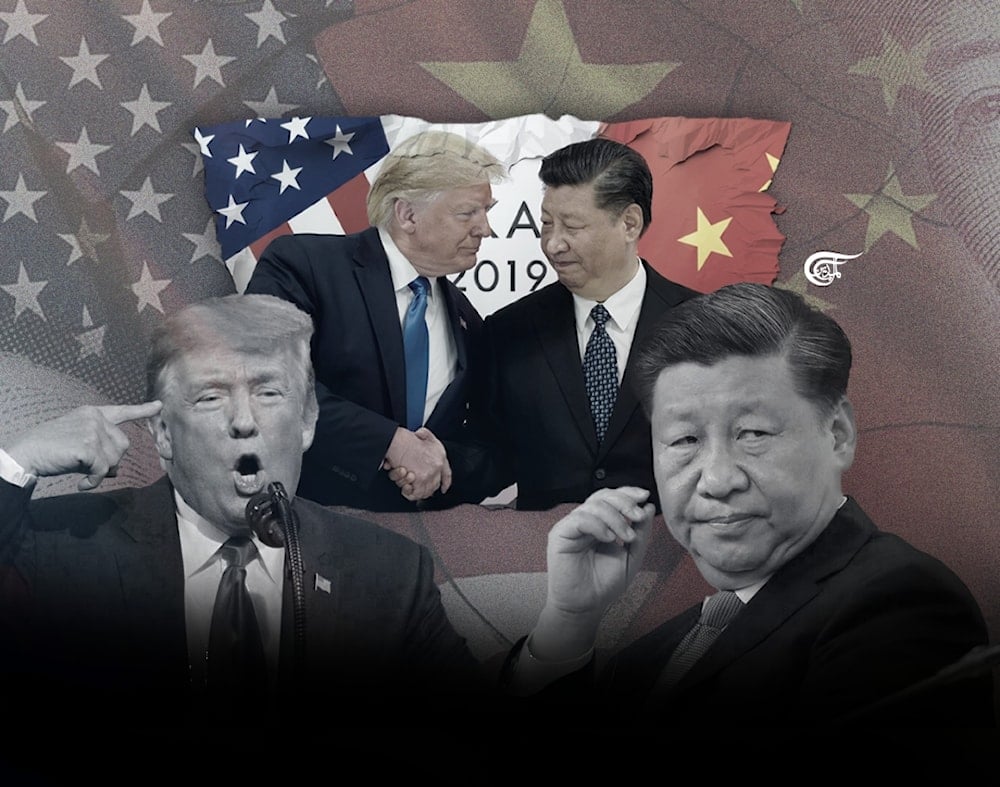Let stability prevail over turbulence in China-US ties
Maintaining stability between China and the US is an achievable goal. To say the least, fragile stability is still a much better scenario than constant turbulence.
-

Imposing tariffs on Chinese goods shipped to the US hurts China, but American consumers are the victims as well. (Al Mayadeen English; Illustrated by Zeinab el-Hajj)
China and the US have maintained what some call “fragile stability” in their relationship following a top leaders’ meeting in San Francisco in late 2023. Despite the continued frictions and conflicts, there has been no major instance of crisis between the world’s two largest economies since then. At a time when a new US administration is ready to assume office, bilateral ties are once again coming to a critical juncture. The ball is in the US court in terms of determining the near-future trajectory of this relationship.
From China’s perspective, the root cause of the strained China-US ties is that Washington finds it difficult to accept the rise of China, and this feeling of unease is further reinforced by the fact that, ideologically, China is not seen by the US as a like-minded country. This mindset is illustrated by outgoing president Joe Biden’s recent remark that “China will never surpass us”, and it can help explain the logic behind a wide range of hostile moves taken by Washington, including imposing tech restrictions on China, challenging China’s red line on the Taiwan question, lashing out at China over human rights, etc. Ultimately, those actions are aimed at strategically weakening China. On the contrary, it is from the Chinese government that we’ve heard a consistent message that China and the US should be partners, rather than adversaries.
If China-US tensions spiraled out of control, there would be costly consequences for both sides. In 2023, the Center for Strategic and International Studies, an American think tank, conducted a modeling study on a hypothetical China-US war over Taiwan, finding that such a military conflict would cost the US dozens of warships, hundreds of aircraft, and tens of thousands of service members. That is by no means the price the US is willing to pay. Think about Afghanistan, where the US spent 20 years and more than $2 trillion in a failed mission.
The reality is that a worst-case scenario like a war over Taiwan would be in no one’s interests. This is why the US, on its part, needs to recalibrate its perception of China to avoid strategic miscalculation. In the words of Warren Cohen, a distinguished emeritus professor who has long taught diplomatic studies at the University of Maryland, Baltimore County, China is not looking to take over the world order in the sense that the US dominates it.
Robert Daly, director of the Wilson Center’s Kissinger Institute on China and the United States, says the US needs to understand that “China has a right to feel secure.” Such voices ought to be heard and taken more seriously in the decision-making process of Washington’s China policy. Judging from his first term of office, US President-elect Donald Trump doesn’t seem to be someone obsessed with ideological matters, and he has a perceived dislike of wars. These characteristics of Trump could be helpful to the pursuit of an overall stable China-US relationship during his second term, although some of his other characteristics might bring new uncertainties.
In interpersonal relationships, if you don’t like certain aspects of a person but find it impossible to sever ties with him, then probably you need to learn to pay more attention to the aspects to your liking in this relationship. Compared to attempting to change this person, that is a more realistic way to feel less frustrated. When it comes to China-US ties, the same logic rings true even more so. During his term, Joe Biden had three face-to-face meetings with President Xi Jinping. At a December press conference, Trump said the US and China could work together to solve global problems. This tells us that, no matter who sits in the Oval Office, there is a basic recognition in Washington that the US needs to deal with China. So, instead of complaining about China, why doesn’t the US become more focused on the common interests of the two countries?
American billionaire Elon Musk, who has been tasked with boosting government efficiency for the incoming Trump administration, is a symbol of the common interests of China and the US. In 2024, Musk’s Tesla delivered more than a third of its cars to customers in China. For six years in a row, American companies have ranked first in the size of their exhibition area at a landmark import expo held annually in Shanghai. In other words, the US has a huge business stake in the sustainable growth of China’s economy.
By the same token, both China and the US are the beneficiaries of their two-way trade. A trade war is good for neither side. Imposing tariffs on Chinese goods shipped to the US hurts China, but American consumers are the victims as well. According to studies of the tariffs that Trump imposed in his first term, most of the economic burden was ultimately borne by US consumers. The non-partisan Peterson Institute for International Economics estimates that Trump’s new proposed tariffs would lower the incomes of Americans, with a typical household in the middle of the US income distribution expected to lose around $1,700 each year.
Last but not least, a stable China-US relationship is arguably an overwhelming aspiration of the rest of the world. The New York-based Eurasia Group Foundation conducted a survey in South Korea, the Philippines, and Singapore in 2023. Large majorities of the surveyed residents expressed significant concerns about the impact of heightened China-US tensions. The Asia Pacific region is the main arena where the US seeks geopolitical confrontation with China, so the survey’s result is somehow a reflection of a widespread worry across the region. “When elephants fight, the grass is trampled” is the aphorism repeatedly used by former Singaporean Prime Minister Lee Hsien Loong when he expressed his concerns about China-US conflicts.
Meanwhile, a separate survey conducted by the European Council on Foreign Relations in the same year suggested that majorities of Europeans would want to remain neutral in a possible China-US conflict over Taiwan. This finding sheds light on an underlying sentiment that Europeans don’t want to see a crisis between China and the US. A refusal to pick sides is also an explicit message from many Global South countries across Africa, Middle East, and Latin America, as they attach importance to their ties with both China and the US.
A responsible global power is supposed to live up to the expectations of the international community. Frankly, it is quite challenging to fundamentally resolve the structural problems that have resulted in the tensions between China and the US. Doing so might take decades, if it can ever be done. That said, maintaining stability in this relationship is an achievable goal. To say the least, fragile stability is still a much better scenario than constant turbulence.

 Ding Heng
Ding Heng
 7 Min Read
7 Min Read











